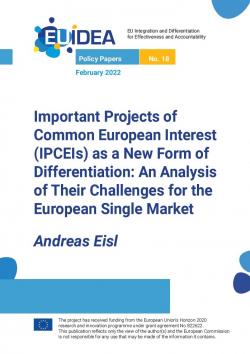Important Projects of Common European Interest (IPCEIs) as a New Form of Differentiation: An Analysis of Their Challenges for the European Single Market
In support of a more active EU industrial policy, so-called Important Projects of Common European Interest (IPCEIs) have been increasingly used in recent years. IPCEIs can, however, create some tensions with EU competition policy, and thus the functioning of the Single Market. In this paper, we show that these tensions are linked mainly to the nature of IPCEIs, constituting budgetary differentiation with a comparatively informal and vague governance framework. The identified key challenges for the Single Market’s level playing field are differences in financial, technical and administrative capabilities between member states and their enterprises as well as shortcomings in the arrangements governing the creation, implementation and evaluation of IPCEIs. Based on analyses of the public consultation for the recent revision of the Commission’s IPCEI communication and all currently approved national recovery and resilience plans, we find that the identified challenges have not been addressed sufficiently so far. To alleviate some of the tensions between EU industrial policy and competition policy we recommend to finance IPCEIs through European rather than national funding and to implement a more inclusive and coherent governance framework.
-
Details
Rome, IAI, February 2022, 23 p. -
In:
-
Issue
Policy Paper 18
Executive summary
Introduction
1. IPCEIs and the (un)differentiated nature of the Single Market
1.1 Existing forms of differentiation in the Single Market
1.2 IPCEIs as new form of differentiation in the Single Market
2. Questions raised by IPCEIs for the functioning of the Single Market
3. Overview of existing and planned IPCEIs
4. Challenges of IPCEIs for the functioning of the Single Market
4.1 Differences in member state capabilities
4.2 Differences in enterprise capabilities
4.3 Lack of transparent and inclusive governance
5. Recent opportunities to address challenges from IPCEIs for the Single Market
5.1 An insufficient revision of the IPCEI communication
5.2 The partially missed opportunity of European grants
Conclusions and recommendations
References



